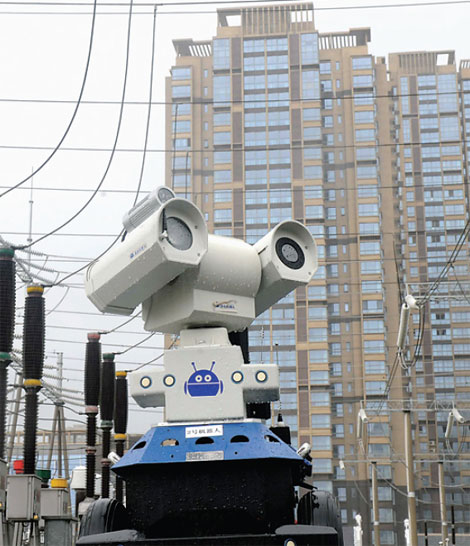


A robot monitors power-transmission equipment during a rainstorm in Chuzhou, Anhui province, on Aug 10, 2015. [Photo/China Daily]
"Though the domestic scientific community has been researching robots for many years, the robot industry is still in its infancy," said Hao Yucheng, deputy director of the China Robot Industry Alliance.
"The bulk of enterprises have no intellectual properties, talents, and cash. They are just entering the sector with enthusiasm and doing repetitive jobs like assembling robots instead of making robots," he said.
In 2014, China bought over 57,000 industrial robots, but less than 30 percent of them are from domestic suppliers, data from the China Robot Industry Alliance shows.
Foreign heavyweights including ABB Ltd, KUKA Robotics Corp and FANUC Corp are sharing the rest 70 percent of the market.
"China's robot industry is like a toddler. But it is growing in the world's largest robot market where many competitive foreign enterprises are scrambling for a pie. Opportunities abound, so do challenges. A simple mistake is likely to nip the industry in the bud," Qu of Siasun said.
Also, a wide technological gap still exists between domestic robot manufacturers and their foreign counterparts.
China now has few enterprises that can provide mass produced and reliable industrial robot components such as speed reducers, drive and control devices, as well as servomotors.
"Most of these components are still imported from foreign countries, whose steep tariffs increase the cost of robots," Hao of the China Robot Industry Alliance said.
For instance, speed reducers could account for about 30 percent of domestic robots' cost, compared with only 12 percent for similar Japanese robots, an industry resource said.
 |
 A foreign girl explains what China should be proud of
A foreign girl explains what China should be proud of Chinese navy's air-cushioned landing craft in pictures
Chinese navy's air-cushioned landing craft in pictures Chinese pole dancing master opens class in Tianjin
Chinese pole dancing master opens class in Tianjin PLA holds joint air-ground military drill
PLA holds joint air-ground military drill Charming female soldiers on Xisha Islands
Charming female soldiers on Xisha Islands Beautiful skiers wear shorts in snow
Beautiful skiers wear shorts in snow Getting close to the crew on China's aircraft carrier
Getting close to the crew on China's aircraft carrier Chinese stewardess celebrate test flight at Nansha Islands
Chinese stewardess celebrate test flight at Nansha Islands Pentagonal Mart becomes the largest vacant building in Shanghai
Pentagonal Mart becomes the largest vacant building in Shanghai Top 20 hottest women in the world in 2014
Top 20 hottest women in the world in 2014 Top 10 hardest languages to learn
Top 10 hardest languages to learn 10 Chinese female stars with most beautiful faces
10 Chinese female stars with most beautiful faces China’s Top 10 Unique Bridges, Highways and Roads
China’s Top 10 Unique Bridges, Highways and Roads Rent a womb
Rent a womb Go princess gone
Go princess gone Sex goes high-tech
Sex goes high-tech Scholars call for a ban on churches in Confucius’ hometown
Scholars call for a ban on churches in Confucius’ hometownDay|Week